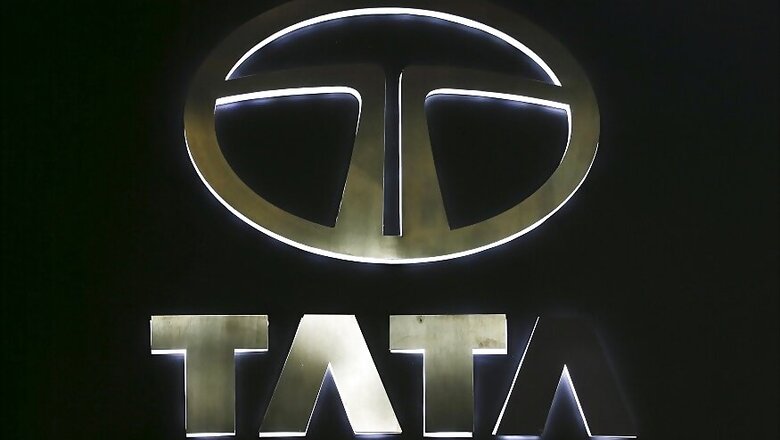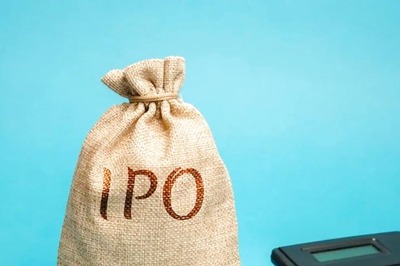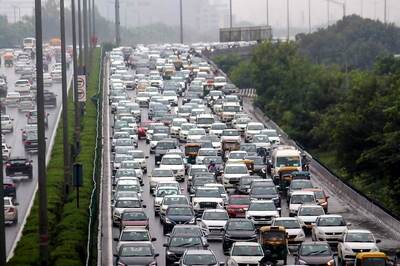
views
Tata Motors on Monday reported a consolidated net loss of Rs 9,863.73 crore in the fourth quarter ended March 31, with the coronavirus-induced lockdown taking a toll on British arm JLR as well as its domestic business.
The company had posted a net profit of Rs 1,108.66 crore in the January-March period of the financial year 2018-19.
Its revenue from operations stood at Rs 62,492.96 crore in the March 2020 quarter, compared with Rs 86,422.33 crore in the corresponding period a year ago, Tata Motors said in a statement.
On a standalone basis, the company reported a net loss from continuing operations at Rs 4,871.05 crore in the fourth quarter ended March 31, 2020. It had reported a net profit of Rs 106.19 crore in the same period of the financial year 2018-19.
The company's British arm Jaguar Land Rover (JLR) reported a loss of 501 million pounds in the quarter under review, while the revenue was at 5.4 billion pounds.
For the financial year 2019-20, Tata Motors reported a consolidated net loss of Rs 11,975.23 crore, compared with Rs 28,724.2 crore in 2018-19.
Total revenue from operations for 2019-20 stood at Rs 2,61,067.97 crore, compared with Rs 3,01,938.40 crore in 2018-19.
For full 2019-20, JLR reported a net loss of 422 million pounds while the revenues were at 23 billion pounds.
In India, demand that was already adversely impacted by the general economic slowdown, liquidity stress and stock corrections due to the BS-VI transition, was further affected by the lockdown. Steep volume decline, particularly medium and heavy commercial vehicles, and resulting negative operating leverage impacted profitability and cash flows, Tata Motors said.
As for JLR, the company said that after the British arm's return to profit in second and third quarters, which reflected improvements achieved through its transformation programme, fourth quarter results were significantly impacted by the coronavirus pandemic.
Tata Motors CEO and MD Guenter Butschek said the auto industry faced strong headwinds in 2019-20 amid a slowing economy due to multiple factors -- liquidity crisis, high fuel prices, changes in axle load norms and BS6 transition. The factors led to weak consumer sentiments and subdued demand across segments.
"Disruption in the supply chain induced by the pandemic and the nationwide lockdown in mid-March 2020 added to the problems," he said.
Butschek further said, "Disappointingly, even with our relentless focus on retail acceleration, 'Mission Zero' on BS-IV inventory and stringent cost reduction initiatives, we have not been able to mitigate the impact on our financials.
In order to move forward to a sustainable business, the company said it planned a rigorous regimen to conserve cash. Outling the details, Tata Motors Group Chief Financial Officer PB Balaji said in a conference call that the company plans to deleverage its entire business with focus on cost and cash savings in both JLR and the domestic business.
The plan includes focussing only on projects that are necessary while doing away with the non-critical ones both at Tata Motors and JLR, he noted.
"We are aiming to make Tata Motors cash-positive this fiscal itself and JLR next year," Balaji said.
On a standalone basis, Tata Motors has initiated a cost savings programme of Rs 1,500 crore and a cash improvement programme of Rs 6,000 crore in the current financial year.
As part of this, the company has deferred or cancelled lower margin and non-critical investment and is targeting a capital expenditure of Rs 1,500 crore in the current financial year, substantially lower than Rs 5,300 crore in 2019-20, Balaji said.
On a standalone basis, the company currently has a free cash flow of around Rs 6,700 crore.
With lockdowns in the first quarter, the company said it expects significantly lower sales in the quarter and negative free cash flow of about Rs 5,000 crore in the April-June quarter of the current fiscal.
On sales outlook, the auto major said it expects a gradual recovery of sales and cash flows for the remainder of the year and expects to end the fiscal with positive free cash flows.
Tata Motors' total wholesales, including exports, declined by 35.1 per cent in 2019-20 to 4,75,207 units.
Similarly, it reported a 37.4 per cent dip in its domestic passenger vehicle volumes in 2019-20.
JLR, on the other hand, has now increased the cost savings target for March 2021 to 5 billion pounds, implying 1.5 billion pound of cost and cash savings in the current financial year.
As part of this, the company has deferred or cancelled lower margin and non-critical investment and is targeting investment spending of 2.5 billion pounds in 2020-21, substantially lower than 3.3 billion pounds in 2019-20, Balaji said.
The company expects a gradual recovery of sales and improving cash flows for the remainder of the year.
"In China, we are beginning to see recovery in vehicle sales and customers are returning to our showrooms. Our operational fitness gives me confidence that we can weather this (coronavirus) storm," JLR Chief Executive Ralf Speth said.
The company's retail unit sales fell 30.9 per cent in the fourth quarter and 12.1 per cent in 2019-20.




















Comments
0 comment